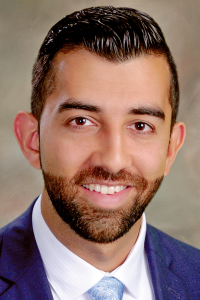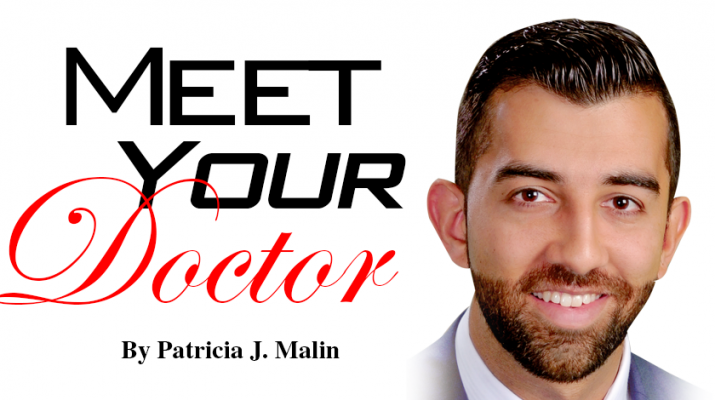Ramesh Cherukuri recently accepted a position as a neurologist-clinical neurophysiologist at Slocum-Dickson Medical Group in his hometown of New Hartford. He recently spoke with Mohawk Valley In Good Health senior writer Patricia J. Malin about his background and his career expectations.
By Patricia J. Malin
 Q.: What are the differences between a neurologist and clinical neurophysiologist?
Q.: What are the differences between a neurologist and clinical neurophysiologist?
A.: A neurologist is a medical doctor who specializes in the diagnosis and treatment of diseases of the nervous system. A clinical neurophysiologist is a neurologist with an additional year of fellowship training in the use of electroencephalography, electromyography, nerve conduction studies and other evoked potential studies of the nervous system. While a neurologist can technically perform these tests, this additional fellowship training affords the neurologist additional expertise in the performance and interpretation of these tests.
Q.: What motivated you to select neurology as your field of specialty? What influenced you in that particular direction?
A.: I chose neurology for the challenge. So much is unknown in the field and we are learning more every day. Nowadays we are able to offer our patients a lot more in terms of diagnosis and treatment for many diseases that previously were unknown, misunderstood or had no treatment.
Q.: What are the more common illnesses and diseases you diagnose and treat as a neurologist?
A.: The more common neurological problems I deal with are headaches, epilepsy, stroke, neuropathy and neck and back pain with associated nerve root compression.
Q.: What recent technological breakthroughs have occurred which have made diagnosis and treatment more efficient and effective in the field of neurology?
A.: Probably one of the more exciting and recent advances is stem cell therapy. Numerous studies have shown that the use of stem cells can lead to the restoration of neurological functioning in people with conditions such as stroke, amyotrophic lateral sclerosis, multiple sclerosis, spinal cord injury, Parkinson’s disease, Alzheimer’s disease and cerebral palsy.
Q.: How can individuals help their own neurological health?
A.: People should eat a well-balanced diet, exercise and make sure to follow up with their primary care doctor at least once per year unless otherwise specified. People must also remember that taking more vitamins is not necessarily a good thing and that they should only take recommended doses.
Q.: What characteristics and personal strengths are necessary in order to become a successful neurologist?
A.: I believe to be successful in the field of neurology, one must have a passion for the subject, good deductive reasoning skills, sincere empathy and the desire to use these skills to help those in need.
Q.: What gives you the most gratification as a neurologist?
A.: The most gratifying part of my job is taking care of people in their most vulnerable state and somehow making it a little less scary for them.
Q.: What are the more challenging aspects of your profession?
A.: The most challenging part of being a neurologist is treating people with a terminal disease. In some ways, it is these people who need us the most, even if for nothing more than emotional support and a friendly ear.
Q.: Is there a shortage of neurologists statewide and nationwide? Is it a popular choice among medical students?
A.: There is a shortage of neurologists nationwide and it is projected to worsen significantly by 2025. Fewer medical students are going into the field due to declining reimbursement rates in the setting of rising student debt. It’s a formula for disaster for all of medicine if it continues in this fashion.
Q.: What would you like to ultimately achieve as a high-level health care practitioner from a career perspective?
A.: Ultimately, I’d like to lead a team of physician assistants and/or nurse practitioners so that we can provide quality care to as many people as possible.
Lifelines
Age: 32 (33 on Oct. 26)
Birthplace: Syracuse
Current Residence: New Hartford
Education: New Hartford High School; Bachelor of Science degree in biology, Siena College, Albany, (2003-2007); doctor of medicine, summa cum laude (ranked first in the class based on cumulative grade point average), American University of Antigua College of Medicine, St. John’s, Antigua (2007–2011); internal medicine internship, SUNY Upstate Medical University, Syracuse (2012-13); neurology residency, SUNY Upstate Medical University, Syracuse (2013-2016); SUNY Upstate clinical neurophysiology fellowship (clinical neurophysiology board exam to be taken in October)
Family: Married with two children
Hobbies: Spending time with family and friends, TV, movies, cars, swimming

